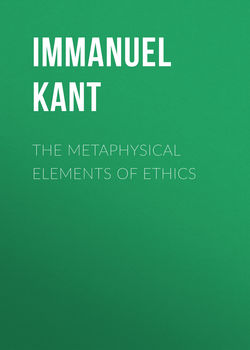Читать книгу The Metaphysical Elements of Ethics - Immanuel Kant, Иммануил Кант - Страница 2
REMARK
ОглавлениеTo virtue = + a is opposed as its logical contradictory (contradictorie oppositum) the negative lack of virtue (moral weakness) = 0; but vice = – a is its contrary (contrarie s. realiter oppositum); and it is not merely a needless question but an offensive one to ask whether great crimes do not perhaps demand more strength of mind than great virtues. For by strength of mind we understand the strength of purpose of a man, as a being endowed with freedom, and consequently so far as he is master of himself (in his senses) and therefore in a healthy condition of mind. But great crimes are paroxysms, the very sight of which makes the man of healthy mind shudder. The question would therefore be something like this: whether a man in a fit of madness can have more physical strength than if he is in his senses; and we may admit this without on that account ascribing to him more strength of mind, if by mind we understand the vital principle of man in the free use of his powers. For since those crimes have their ground merely in the power of the inclinations that weaken reason, which does not prove strength of mind, this question would be nearly the same as the question whether a man in a fit of illness can show more strength than in a healthy condition; and this may be directly denied, since the want of health, which consists in the proper balance of all the bodily forces of the man, is a weakness in the system of these forces, by which system alone we can estimate absolute health.
